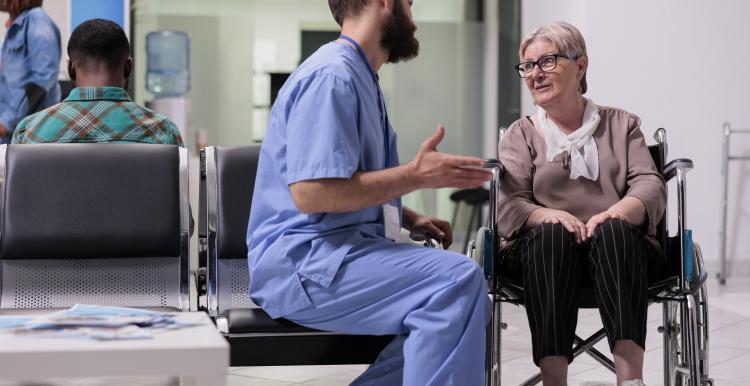Why support for patients with chronic pain must be improved

For millions of people in England, chronic pain is a daily reality. From back problems and arthritis to fibromyalgia, injuries, and the after-effects of surgery or cancer, pain can be a constant burden.
Living with chronic pain limits your ability to live and work, it can feel isolating and has a negative impact on people’s mental health. Research on participants from the UK Biobank estimates that nearly half (46%) of people with widespread chronic pain have also experienced depression. Ensuring people have the right support from the NHS to manage pain and protect wellbeing is therefore vital.
This kind of support spans different parts of the NHS, such as:
- Initial help from GPs, or practice-based physiotherapists to whom patients may be able to self-refer.
- Hospital-based multidisciplinary pain clinics, staffed by multidisciplinary teams that may include pain consultants, physios, specialist nurses, clinical psychologists, occupational therapists and pharmacists.
- Highly specialist national services for very complex patients.
The stories shared with us, however, show many patients have a poor experience of accessing pain management support.
The problems patients are facing
People told us about long waits, cancelled appointments, poor aftercare, and feeling like they weren’t listened to. For some, there were multiple barriers and delays, and we heard from people who felt forced to pay for help or go without care.
Long waits for care
One of the most common issues patients raised was long waiting times. People described months - sometimes years - of waiting for treatment, often without updates or clear timelines.
A 2022 survey commissioned by BBC News found that nearly a quarter (23%) of people who live with chronic pain are on waiting lists for surgery or a pain-management programme.
When treatment plans are agreed but never followed up, patients lose trust in the system meant to support them.
"I suffer with Fibromyalgia and Chronic Pain Syndrome and rely on the pain team for regular treatments. In May 2024 I had a lidocaine infusion on the understanding that the follow-up would be six months later – we are now in May 2025 and I’m still waiting. There’s been no letters since July 2024."
Story shared with Healthwatch Norfolk
Administrative failures
Many people told us that delays to their care are caused by lost referrals, letters sent to the wrong address, and inaccurate records.
For patients already in pain, chasing paperwork adds another layer of distress.
"I was referred to pain management. After waiting 18 months I asked when I would be seen, only to be told I was taken off the list. They had sent my appointment to the wrong address."
Story shared with Healthwatch Blackpool
"I had referrals requested in January 2025, now told they were never made, although the NHS app shows otherwise."
Story shared with Healthwatch Hertfordshire.
Poor communication
Lack of communication from healthcare teams was a recurring theme. People felt abandoned while waiting, with no support or advice to help them cope. Simple measures, such as information packs, peer support, or check-ins could make long waits less isolating.
"I have been waiting for almost a year to be seen by the hospital pain clinic. I need support whilst waiting, like a list of books that could help or something. Like going on a course for diabetes. It has been a 6 month wait for an urgent referral."
Story shared with Healthwatch Warwickshire
Medication issues
Some people told us about GPs reducing or stopping prescriptions without consulting them first, leaving them in pain or at risk of harm.
We also heard from people whose pain clinic was abruptly shut down which can make accessing care and medication harder.
Patients who struggle to leave their home because of their pain can have trouble getting their pain prescriptions, and carers of patients told us they struggle to pick up medication during limited hours. In one case, a housebound patient told us that despite a consultant’s letter and a joint meeting with the GP practice and pharmacy, they still found their medication wasn’t ready on time, leaving them frustrated and without essential pain relief.
The impact on people’s lives
Living with untreated pain affects every part of life. People described losing their jobs, income, and independence.
"I’m on a 50-week waiting list for a pain clinic appointment and have lost my job as head cook."
Story shared with Healthwatch North Yorkshire
Others said they had no choice but to self-medicate, even when it was unsafe.
"I'm taking ibuprofen which I shouldn’t be as I’m on blood thinners, but I can’t cope without it. I’ve been told it won’t be until March 2026 before I'm seen."
Story shared with Healthwatch Norfolk
In one particularly tragic case, a patient with severe back pain waited months for a referral. He was then diagnosed with cancer and died soon after. The family got in touch with Healthwatch as they believed earlier checks might have helped save his life.
For those who can afford it, the contrast between NHS delays and private treatment is stark. This two-tier system leaves those can’t afford to go private suffering.
“I had to make 26 phone calls to try and get a date, and either nobody answered, a message came up saying they'd call back (nobody ever did) or when I did speak to a person they said they'd arrange something, but nothing came. I had to pay for a scan (£1000 privately) and then see the pain specialist privately, who was able to give me the treatment I required 5 days later. And I returned to a normal life almost immediately - my purse, and confidence in an NHS that I have nursed in for 47 years.... shattered."
Story shared with Healthwatch Richmond upon Thames
When care works well
Not all experiences were negative. Some patients spoke of excellent care that was respectful, holistic, and empowering.
"The Doctor treated me with respect and as an equal - provided me with all the relevant information I needed and helped me to feel really motivated to be able to take control of managing my pain. There is the opportunity for face to face meetings with the pain management team, including physiotherapy, occupational therapy, emotional support. It has made a real difference to how I control and manage my level of pain. "
Story shared with Healthwatch Cambridgeshire
Others praised group courses where peer support was as valuable as clinical advice.
“Group courses on arthritis pain management very beneficial. Not just the exercise advice and classes but also the sharing of experiences with other arthritis patients - good for mental health too.”
Story shared with Healthwatch North East Lincolnshire
These stories show that good care is happening. However, action needs to be taken to ensure this becomes the standard, not the exception.
By learning from people’s experiences both the frustrations and the examples of care that worked well, the NHS can build a system that is fairer and more consistent.
What needs to change?
Many of the changes required to improve care of people with chronic pain fall under current government ambitions, such as:
- Cutting waiting times for people needing outpatient appointment or hospital treatment, down to no longer than 18 weeks from GP referral, by 2029.
- Delivering more care outside of hospital, in multidisciplinary neighbourhood health services or centres, and by encouraging GPs through incentive payments to seek ‘Advice and Guidance’ from consultants about how patients can be managed instead of, or ahead of any hospital follow-up.
- Greater use of digital tools to deliver health management programmes (such as an AI physio tool used by one NHS trust in the East of England).
Increasing and making the most of health professionals
A refreshed NHS workforce plan, due later this year, creates an opportunity to review recruitment targets for different professions. Professional bodies are calling for:
- More specialist GPs in pain able to provide more care outside of hospital, such as pain injections
- First Contact physiotherapist also enabled to do more in primary care, such as prescribing and ordering investigations
- Ensuring hospital pain clinics contain a full multidisciplinary team
Providing a full range of support, not just medication
Health professionals and patients have called for access to a full range of therapies to be made available, regardless of where you live, such as:
- Psychological support
- Support groups
- Back-to-work programmes
- Physiotherapy
- Affordable access to exercise and wellbeing activities.
It’s particularly important for patients with limited mobility to know what help is available for travelling to appointments or collecting medication – such as free delivery services offered by some pharmacies and patient transport for hospital appointments.
Finally, support while waiting for care and appointments is vital, through better admin processes, referral management on the NHS App and trained care navigators to signpost people to information and interim support.



